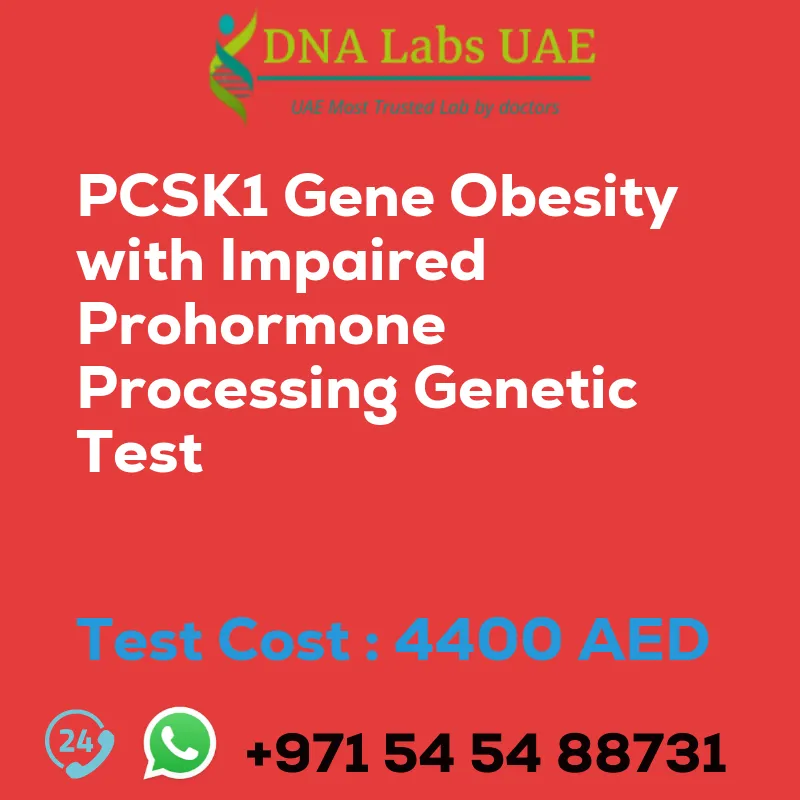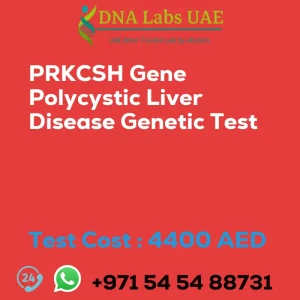PCSK1 Gene Obesity with impaired prohormone processing Genetic Test
At DNA Labs UAE, we offer the PCSK1 Gene Obesity with impaired prohormone processing Genetic Test at a cost of AED 4400.0. This test is designed to diagnose and identify mutations in the PCSK1 gene, which is responsible for encoding an enzyme called proprotein convertase subtilisin/kexin type 1 (PCSK1).
The PCSK1 enzyme is crucial for the processing of prohormones such as proinsulin, proglucagon, and proopiomelanocortin (POMC), which play a vital role in regulating appetite, energy expenditure, and glucose metabolism.
Individuals with PCSK1 gene mutations often experience early-onset obesity, starting in infancy or early childhood. This obesity is usually severe and difficult to manage, even with dietary and lifestyle interventions. Other metabolic abnormalities associated with PCSK1 gene mutations include hyperphagia (excessive hunger), hypoglycemia (low blood sugar), and impaired glucose tolerance. Some individuals may also have developmental delays, intellectual disabilities, or psychiatric disorders.
To diagnose PCSK1 gene mutations and confirm the underlying cause of obesity and impaired prohormone processing, we offer a Next-Generation Sequencing (NGS) genetic test. This test analyzes the DNA sequence of the PCSK1 gene to identify any mutations or variants that may be present. NGS genetic testing is highly accurate and efficient, providing valuable information for the diagnosis, management, and genetic counseling of individuals with PCSK1 gene mutations and associated metabolic disorders.
It is important to note that genetic testing should be done under the guidance of a healthcare professional, such as a geneticist or genetic counselor, who can help interpret the results and provide appropriate recommendations for further evaluation and management.
Test Details
- Components: PCSK1 Gene Obesity with impaired prohormone processing Genetic Test
- Price: AED 4400.0
- Sample Condition: Blood or Extracted DNA or One drop Blood on FTA Card
- Report Delivery: 3 to 4 Weeks
- Method: NGS Technology
- Test type: Hepatology Nephrology Endocrinology Disorders
- Doctor: General Physician
- Test Department: Genetics
- Pre Test Information: Clinical History of Patient who is going for PCSK1 Gene Obesity with impaired prohormone processing NGS Genetic DNA Test. A Genetic Counselling session to draw a pedigree chart of family members affected with PCSK1 Gene Obesity with impaired prohormone processing NGS Genetic DNA Test gene PCSK1
For more information or to schedule a PCSK1 Gene Obesity with impaired prohormone processing Genetic Test, please contact our lab.
| Test Name | PCSK1 Gene Obesity with impaired prohormone processing Genetic Test |
|---|---|
| Components | |
| Price | 4400.0 AED |
| Sample Condition | Blood or Extracted DNA or One drop Blood on FTA Card |
| Report Delivery | 3 to 4 Weeks |
| Method | NGS Technology |
| Test type | Hepatology Nephrology Endocrinology Disorders |
| Doctor | General Physician |
| Test Department: | Genetics |
| Pre Test Information | Clinical History of Patient who is going for PCSK1 Gene Obesity with impaired prohormone processing NGS Genetic DNA Test. A Genetic Counselling session to draw a pedigree chart of family members affected with PCSK1 Gene Obesity with impaired prohormone processing NGS Genetic DNA Test gene PCSK1 |
| Test Details |
The PCSK1 gene is responsible for encoding an enzyme called proprotein convertase subtilisin/kexin type 1 (PCSK1). This enzyme plays a crucial role in the processing of various prohormones, including proinsulin, proglucagon, and proopiomelanocortin (POMC). These prohormones are important for regulating appetite, energy expenditure, and glucose metabolism. Mutations in the PCSK1 gene can lead to impaired prohormone processing, resulting in various metabolic disorders. One of the main consequences of PCSK1 gene mutations is obesity. Individuals with PCSK1 gene mutations often have early-onset obesity, starting in infancy or early childhood. This obesity is usually severe and difficult to manage, even with dietary and lifestyle interventions. In addition to obesity, individuals with PCSK1 gene mutations may also experience other metabolic abnormalities. These can include hyperphagia (excessive hunger), hypoglycemia (low blood sugar), and impaired glucose tolerance. Some individuals may also have developmental delays, intellectual disabilities, or psychiatric disorders. To diagnose PCSK1 gene mutations and confirm the underlying cause of obesity and impaired prohormone processing, a Next-Generation Sequencing (NGS) genetic test can be performed. This test analyzes the DNA sequence of the PCSK1 gene to identify any mutations or variants that may be present. NGS genetic testing is a highly accurate and efficient method for identifying genetic variations. It can provide valuable information for the diagnosis, management, and genetic counseling of individuals with PCSK1 gene mutations and associated metabolic disorders. It is important to note that genetic testing should be done under the guidance of a healthcare professional, such as a geneticist or genetic counselor, who can help interpret the results and provide appropriate recommendations for further evaluation and management. |








